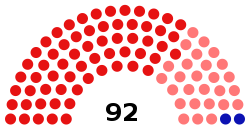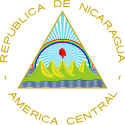National Assembly (Nicaragua)
This article appears to contradict the article es:Asamblea_Nacional_de_Nicaragua. (August 2016) |
National Assembly of the Republic of Nicaragua Asamblea Nacional de la República de Nicaragua | |
|---|---|
 | |
| Type | |
| Type | |
| Structure | |
| Seats | 92 deputies (90 of whom are elected by popular vote on a proportional representation basis from party lists: 20 nationally, and 70 representing the country's departments and autonomous regions). |
 | |
Political groups | Sandinista National Liberation Front (63) Independent Liberal Party (27) Constitutionalist Liberal Party (2) |
| Elections | |
| Party-list proportional representation | |
Last election | Nicaraguan general election, 2011 |
| Meeting place | |
| Managua | |
| Website | |
| www | |
 |
|---|
|
|
The National Assembly (Spanish: Asamblea Nacional) is the legislative branch of the government of Nicaragua.
Composition
The Nicaraguan legislature is a unicameral body. It is made up of 92 deputies, 90 of whom are elected by popular vote on a proportional representation basis from party lists: 20 nationally, and 70 representing the country's departments and autonomous regions. In addition, the President of the Republic who served the immediately previous presidential term is entitled to sit in the Assembly as a deputy, as is the runner-up in the most recent presidential election. The President and the National Assembly serve concurrent five-year terms.
To be eligible for election to the Assembly, candidates must be (Art. 134, Constitution):
- Nicaraguan nationals. If they have held any other nationality, it must have been renounced at least four years prior to the election.
- In full enjoyment of their political and civic rights.
- At least 21 years old.
- Residents of the country for at least four years prior to the election (exemptions are granted to members of the diplomatic corps and employees of international organisations, and to those recently returned from studying abroad).
- Born in the department or autonomous region they hope to represent, or having resided there for at least two years prior to the election.
The following are disqualified from serving in the Assembly:
- Ministers, vice-ministers, and other members of the cabinet, magistrates and judges, and mayors, unless they resign from those positions at least 12 months prior to the election.
- Ministers of any church or religious organisation, unless they have relinquished their ministry at least 12 months in advance of the election.
Four months before the Nicaraguan general election, 2016, the Nicaraguan Supreme Court removed PLI leader Eduardo Montealegre, decreeing that Pedro Reyes was the new leader of the PLI. After PLI and allied Sandinista Renovation Movement deputies objected, Nicaragua's Supreme Electoral Council ordered them removed from the National Assembly and empowered Reyes to select their replacements.[1]
Election results
Template:Nicaraguan legislative election, 2011
Parliamentary groups
The deputies are organized in three Parliamentary Groups (bancadas).
- Sandinista National Liberation Front (FSLN): 63 deputies
- Independent Liberal Party (PLI): 27 deputies
- Constitutionalist Liberal Party (PLC): 2 deputies
Other parliamentary bodies
Nicaragua also returns deputies to the supranational Central American Parliament.
See also
- List of Presidents of the National Assembly of Nicaragua
- Politics of Nicaragua
- List of legislatures by country
- List of political parties in Nicaragua
References
- ^ "Nicaragua electoral authority unseats opposition lawmakers". Washington Post. 31 July 2016. Retrieved 31 July 2016.

